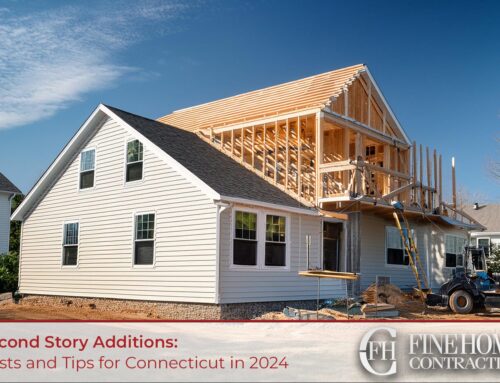As a realtor in Connecticut, one of your key responsibilities is ensuring that your clients find the perfect homes. However, what happens when your clients need more than just a home? When they’re looking to renovate, remodel, or add to their existing properties, you’ll often need to guide them in finding a reliable contractor. Unfortunately, finding a contractor that is ready to work with a realtor or new homeowner isn’t always as easy as checking the phone book or Angi’s list, especially if your client is using renovation loans or looking to get the process started before closing. In this comprehensive guide, we’ll walk you through the process of finding a contractor as a realtor in Connecticut, covering everything from initial research to project completion. Let’s get started.
The Importance of a Reliable Contractor
Before delving into the specifics, it’s crucial to understand why finding a reliable contractor is paramount. A contractor can make or break a remodeling or addition project. Your reputation as a realtor hinges on your ability to connect clients with trustworthy professionals who deliver quality work on time and within budget.

The Importance of a Reliable Contractor
Before we dive into the specifics of contractor selection, it’s crucial to grasp the pivotal role that a reliable contractor plays in the world of real estate. A contractor is not just a service provider but a cornerstone of your reputation. Your clients depend on your ability to provide recommendations and have a reliable circle of service providers, and it’s oftentimes better not to give a recommendation than to give a bad one. On top of that, you’re looking for a contractor that is willing to talk over your clients plans, assess the feasibility of the project, and accurately provide a quote, which many contractors will not do without charging a site fee or retainer. The success of remodeling or addition projects hinges heavily on the individual contractor’s reliability and competence.
Understanding Your Client’s Needs
Your journey begins with a deep dive into your client’s aspirations and needs. To effectively match them with the right contractor, you must glean a comprehensive understanding of their renovation or addition requirements. Whether it’s a kitchen transformation, a home expansion, or a bathroom overhaul, knowing your client’s objectives, budget constraints, and timelines is paramount.
Getting a firm understanding of your client’s priorities in the remodel, their budget, and the timescale they wish to remodel in is a great first step. Having this key information while you select contractors ensures fluid communication, even expectations across all parties, and a higher chance that the remodel will be exactly what your clients want.
Researching Contractors in Connecticut
Armed with insights into your client’s needs, you’ll embark on the task of researching contractors in the vibrant state of Connecticut. This endeavor involves tapping into diverse resources, including online directories, mining recommendations from industry peers, and actively participating in local home improvement forums. The goal is to create a refined list of contractors renowned for their excellence in the specific type of project your client envisions.
Checking Credentials and References
As you curate your list of potential contractors, the next phase is vetting their credentials meticulously. This entails a comprehensive examination of their licenses, certifications, and insurance coverage. However, it doesn’t end there; you’ll also delve into the realm of client testimonials and references, peering into the contractor’s past projects to ascertain their competence.
It’s important to verify your contractor is licensed and ensured, and has past customer reviews and testimonials to prove their track record. In Connecticut, contractor licenses can be verified on the state website below.
Interviewing Potential Contractors
With your shortlist in hand, you’ll venture into the realm of contractor interviews. These meetings serve as a pivotal juncture where you’ll explore in-depth discussions about your client’s project. It’s an opportunity to gain insights into their approach, adherence to timelines, and strategies for managing unforeseen challenges. The objective is to ensure that the contractor’s ethos aligns seamlessly with your client’s vision.
Assessing Project Compatibility
Compatibility between your client’s project and the contractor’s expertise is the linchpin of successful collaborations. It’s imperative to assess how well each contractor’s skill set aligns with the intricacies of your client’s project. Scrutinize their prior work, seeking alignment with similar projects, to ascertain their ability to deliver the desired outcome.
Negotiating the Contract
The negotiation of the contract is a pivotal step that demands your adept negotiation skills. It’s not merely a legal formality; it’s the blueprint that dictates the project’s scope, budget, timelines, and contingencies. Emphasize the importance of transparency and clarity in this contractual arrangement, laying the foundation for a harmonious collaboration.
Project Management and Communication
Once the project is underway, effective communication becomes the lifeblood of your endeavor. Your role extends beyond just connecting your client with the contractor; it encompasses the establishment of clear communication channels for updates, feedback, and issue resolution. This ensures that your client’s expectations are managed effectively throughout the project’s lifecycle.
Handling Unexpected Challenges
In the realm of construction, unexpected challenges often emerge. As a realtor, your guidance is crucial in helping your client and the contractor navigate these obstacles seamlessly. Whether it’s dealing with project delays, evolving design changes, or budget adjustments, your adept problem-solving skills come to the fore.
Staying on Budget and Schedule
The financial and temporal dimensions of a project demand meticulous oversight to prevent deviations. Encourage regular reviews of the budget and schedule, addressing any variances promptly. This proactive approach ensures that the project remains on course and within the predefined parameters.
Quality Control and Inspections
Quality control is paramount in delivering a project that meets or exceeds expectations. Encourage your client to conduct inspections at various project stages. This not only ensures that quality standards are upheld but also provides an additional layer of reassurance to your clients.
Client Satisfaction and Feedback
Upon the project’s triumphant completion, your journey is far from over. Gathering feedback from your client is essential to gauge their satisfaction with the project and your services. Their contentment not only bolsters your reputation but also opens avenues for reviews and referrals, essential in the real estate arena.
In conclusion, the role of a realtor in Connecticut transcends the mere facilitation of property transactions. It extends into the realm of ensuring that a house truly becomes a home through renovation and addition projects. By following the comprehensive steps outlined in this guide, you can confidently guide your clients in their quest to find the perfect contractor, elevating your status as a trusted and invaluable realtor.







